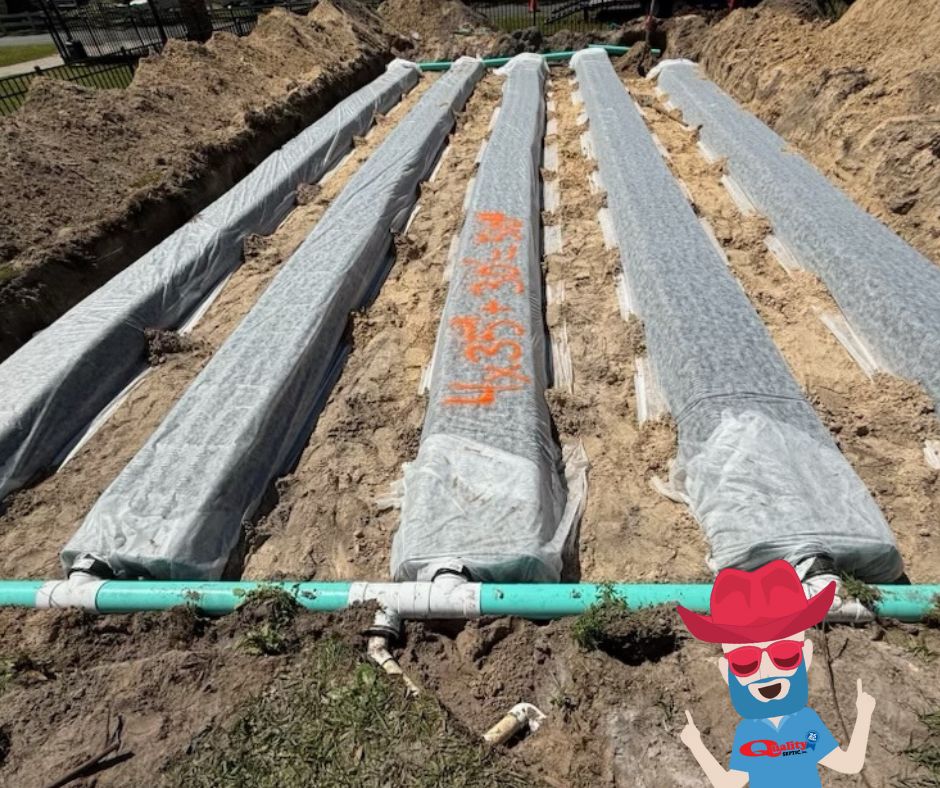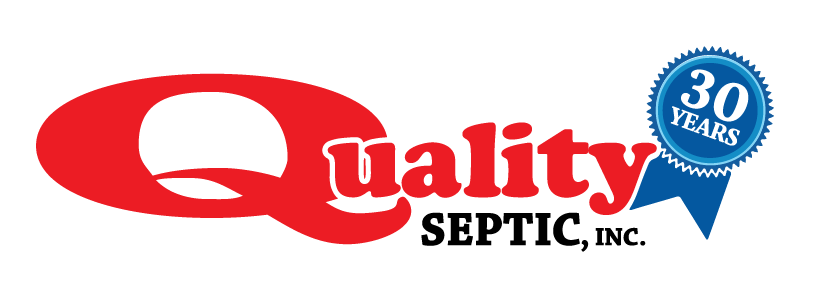
When people think about helping the environment, they usually imagine recycling, turning off lights to save energy, or driving electric cars. But did you know that your septic system can also play a role in protecting the planet? Septic systems are used in all kinds of homes across the country, especially in rural and suburban areas. These systems treat household wastewater right on your property. And even though they’re out of sight, septic systems are doing a lot of good for the earth. In fact, they support environmental sustainability in a few really important ways: by naturally cleaning water, reducing pressure on city treatment plants, and reusing valuable water right in the surrounding soil. Let’s break it down.
Refresher: What’s a Septic System Anyway?
We understand that septic systems may not be top of mind for everyone like they are for us, so we’ll take a moment to explain how a septic system operates. A septic system is an underground setup (think of a container) that takes care of wastewater from your home. When you flush the toilet or use the sink, the wastewater flows into a septic tank buried in your yard. Inside the tank, the waste gets separated into different layers: solids settle at the bottom, grease and oil float to the top, and clear water stays in the middle. The water then moves from the tank into the drain field, which is a section of soil or gravel that helps filter and clean the water before it returns to the ground.
How Do Septic Systems Help the Environment?
Septic systems do more than just take away waste; they support sustainability in several important ways:
1. Natural Water Treatment
One of the key benefits of septic systems is their ability to treat water naturally. Instead of relying on large, centralized treatment plants, septic systems use the soil to clean the water. When the water moves into the drain field, tiny microbes in the soil break down harmful bacteria and other pollutants. This natural process helps purify the water so it can safely return to the surrounding environment.
This natural treatment reduces the chance of pollution reaching lakes, rivers, and groundwater. It’s like giving the earth a helping hand in cleaning the dirty water without using chemicals or energy-intensive processes. As a result, septic systems support a healthier environment by keeping water clean and free of dangerous contaminants.
This process also saves energy. Large treatment plants use machines and chemicals to clean water, which uses a lot of electricity. But septic systems rely on gravity and nature to do the job, which makes them a greener choice.
2. Less Stress on Public Systems
In cities, all the water from homes and businesses has to travel through pipes to a central treatment facility. These systems are expensive to build and maintain, and they require a lot of energy. When more homes use septic systems instead of public sewers, it reduces the workload on these facilities. During heavy rain or flooding, these systems can also overflow, which sometimes leads to untreated sewage being dumped into rivers or lakes.
Having a septic system is especially helpful in rural areas where building a sewer line can be difficult and costly. Septic systems allow homes to take care of their waste locally, which means less traffic of waste through pipes and treatment plants. This reduces energy use, lowers costs, and lessens the chance of overloading public infrastructure. It’s a smart way to manage waste while protecting the environment.
3. Smart Water Use
You may not see it happening, but septic systems help return clean water back into the earth. Once wastewater is treated in the tank and filtered through the drain field, it seeps back into the soil. That water helps recharge groundwater supplies, which are important for wells, plants, and animals. Because of this, septic systems help keep the natural water cycle going. Clean, filtered water from your home returns to the ground where it belongs, instead of being sent miles away to a treatment plant and dumped into a river or ocean.
Another benefit of septic systems? They make people more aware of how much water they use.
Because septic tanks can only handle a certain amount of water at a time, families with septic systems often learn to be careful with their water use. This might include:
- Fixing leaky faucets quickly
- Doing full loads of laundry instead of small ones
- Spreading out water-heavy activities throughout the week
At Quality Septic Inc., we generally see homeowners using less water to take better care of their septic system, which in turn also helps conserve water.
4. Promotion of Sustainable Land Use
Sustainable land use means we are using our land wisely without damaging ecosystems or groundwater. Septic systems support this because they are designed to work harmoniously with the land, helping to keep our environment clean.
Septic systems work best on well-maintained properties where the drain field has enough space and proper soil conditions. This encourages responsible land use and careful planning. When homeowners and developers understand how septic systems work, they are more likely to protect the environment by maintaining their systems properly and avoiding construction that could harm the soil or water sources.
How Can We Make Septic Systems Even More Environmentally Friendly?
While septic systems are already good for the environment, there are ways to make them even better:
- Regular Maintenance: Homeowners should have their septic systems inspected and pumped regularly. This prevents backups and leaks, which can pollute the environment.
- Using Eco-Friendly Products: Avoiding harsh chemicals in cleaning products and laundry detergents helps keep microbes in the septic tank healthy, ensuring the system works efficiently.
- Conserving Water: Using water wisely reduces the load on the septic system, making it more effective and longer lasting.
- Choosing the Right Location: Proper placement of septic systems with good soil and enough space helps protect groundwater sources.
Small System, Big Impact
As our population grows and we face more environmental challenges, septic systems become even more important. They offer a sustainable way to treat waste locally, reduce pollution, save energy, and protect natural resources.
In many parts of our country, especially in rural areas, septic systems are the primary method of waste treatment. They help communities stay healthy and keep the environment clean. By supporting and maintaining septic systems, we are making a positive difference for our planet. They play a big role in environmental sustainability by treating water naturally using soil and microbes, which is safer and more eco-friendly than many other methods. Septic systems also reduce the burden on public infrastructure, save energy, and promote responsible land use.
If we all take care of our septic systems and use them wisely, we can help protect our environment now and for future generations. If you’d like more information on installing a new septic system, or scheduling maintenance for your existing system, call Quality Septic Inc. at 813-737-7093.
